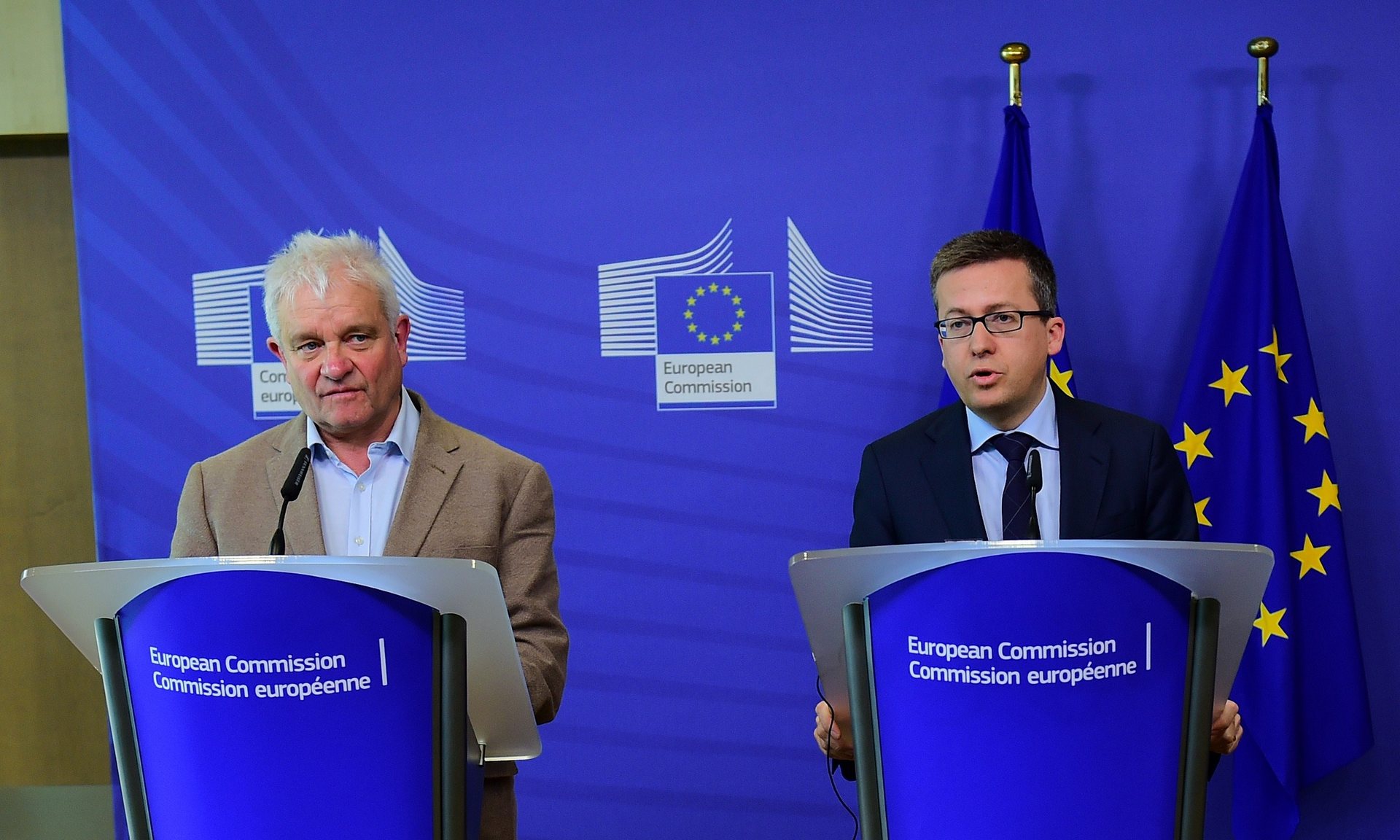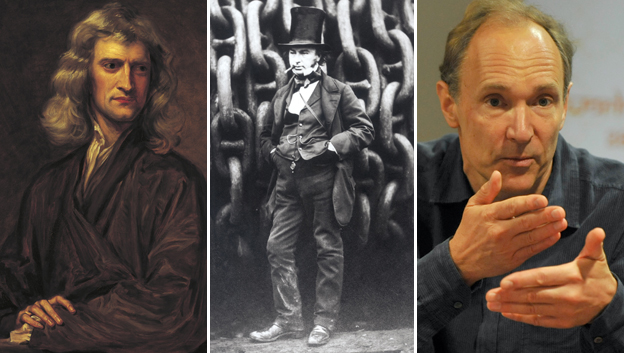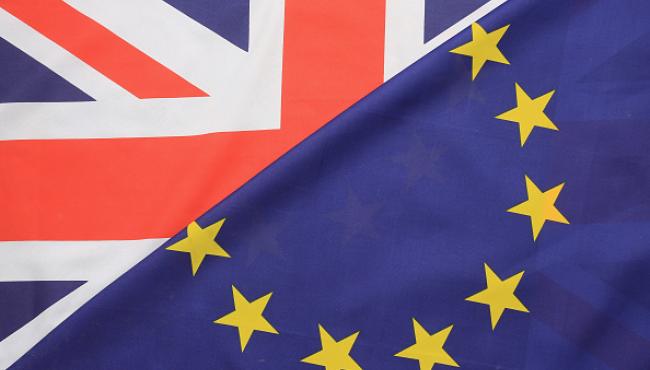UK scientists worry about Brexit
The departure of talented scientists to universities in other countries, the outflow of foreign students and specialists - all this may entail Brexit

Nobel Prize winner (left) Sir Paul Nurse, with the head of the European Commission for Research, Science and Innovation Carlos Moedas in Brussels. Nurs says Brexit will negatively affect British science. (Photo: Emmanuel Dunand / AFP / Getty Images)
Great Britain is a country where many discoveries were made in science, where a large number of different inventions appeared. Newton, Darwin, Creek - these scientists are known to all, and their contribution to science has allowed to change the way of thinking and the way people live. But now scientists of this country are afraid that everything can change. The problem is Brexit, or rather, in the decision of UK citizens to leave the European Union.
After unexpectedly for many UK residents decided to leave the European Union, the leaders of British scientific organizations began to make the most pessimistic predictions about what could happen to research and innovation in the country. In particular, there is an opinion that replacing research funding coming centrally from the EU will simply be nothing after the implementation of the referendum decision. The total amount of grants and various kinds of financial support from the European Union was about $ 1.2 billion a year. This is 10% of the total government-funded research budget.
But even more than a lack of funding, British scientists fear isolation in the scientific world. After the UK leaves the EU, partnerships with various research organizations that have been established for many years may be cut off. The same applies to the possibility of publishing in international scientific journals for the British.
')
More recently, the leaders of the country's scientific community published an open letter in which they reminded that a large number of internationally-known scientists working in British universities are essentially foreigners. The same applies to students, graduate students, doctoral students - many of them are also foreigners. What happens to the entire scientific infrastructure in Britain when the country leaves the EU? Will foreign scientists be able to work without problems in the universities of Albion, and the subjects of the English crown - in research organizations of other countries?

Isaac Newton, Isambard Kingdom Brunel, Tim Berners-Lee
According to Dame Jocelyn Bell Burnell, President of the Royal Society of Edinburgh, about a third of all researchers who work at leading universities in Scotland are EU nationals. Burnell claims that foreigners are now nervous. “If they are offered good conditions anywhere in Europe, they will leave,” she said.
The new Prime Minister of Great Britain Teresa May (Theresa May) considers the preservation of research in the country at the current level as one of the main priorities. British diplomats are already starting negotiations on the cooperation of scientific organizations of the country with research organizations from other countries. In one of the letters to representatives of the scientific community, May writes that in Britain "a large number of the best minds from Europe and the whole world."
Already, the worst fears of the British are beginning to come true - for example, universities in Canada are trying to lure away the talented scientists currently working in Britain.
The Prime Minister of Spain insists that the European Medicines Agency move from London to Madrid. Established in 1995, based in the City of London, United Kingdom. EALS emerged after more than seven years of negotiations between the governments of member countries of the EU. He replaced the "Patented Medicines Committee", founded in 1977, and the "Veterinary Medicines Committee". However, later, the last two institutions were revived as the basis for scientific advisory committees. The agency itself is engaged in the evaluation of drugs for their compliance with the requirements set forth in the European Pharmacopoeia. When the UK ceases to be part of the European Union, it is logical that the agency should change the address.

15% of teachers at British universities are citizens of other European countries. In the best universities, this figure increases to 20%. Well, in some cases, 50% of the teaching staff of British educational institutions are foreigners.
According to Alexander Halliday , professor of geochemistry at Oxford University, 10 years ago, British science was not in such a brilliant state as it is now. During these ten years, according to, the level of scientific thought in the UK has constantly grown, whereas in many other European countries there were problems with science.
The University of Kent positions itself as a “British European University” with divisions in Athens, Brussels, Paris and Rome. After the exit of Britain from the EU will have to change the principles of work and positioning. In addition, about 18% of graduate students at this university are foreigners. Each year, the university infuses about $ 1 billion into the local economy. “One of the biggest problems right now is uncertainty. Researchers and students want to know whether they will need a visa, ”said a university spokesman.

Harmony Toros, a teacher from this university, is of French-Turkish origin. Her husband, an Italian scientist, also works at this university. They have two children. Toros says Brexit affects both her personal life and professional activities. “Now I was planning to receive a grant from the European Research Council. It would be a significant step in my life. But the application - a lengthy document of 90 pages. It will take a month and a half to compile, ”says Toros. It may happen that before making a decision, Britain will leave the EU. And so not very high probability of receiving a grant (from 5 to 10%) will drop to zero if this happens.
“I understand that the European Research Council may not give as much money as I request. But what if I spend a month and a half of work, and consideration does not even take place. Is it worth it?
As for her personal life, she does not quite understand those people who voted to leave the EU. Many of these people are her neighbors, and she is not going to stop communicating with them because of this decision.
Anne Rosser (Anne Rosser) - a researcher from Cardiff University in Wales. She is studying Huntington's disease, a rare disease of the nervous system. Its partners are 8 laboratories from different European countries. All of them are a consortium that can use stem cells to transplant into the damaged brain. But these studies will stop if Britain leaves the EU. “You cannot do this kind of work with the scientists of one country,” says Rosser. If the EU loses Britain, then a series of studies in this and other areas will simply cease.
For the time being, all this is simply fears and assumptions that are based more on emotions than on real events and facts. But nevertheless, if the country ceases to be part of the European Union, then profit will become a reality, and the notorious British scientists will find themselves in a difficult situation.
Source: https://habr.com/ru/post/396597/
All Articles